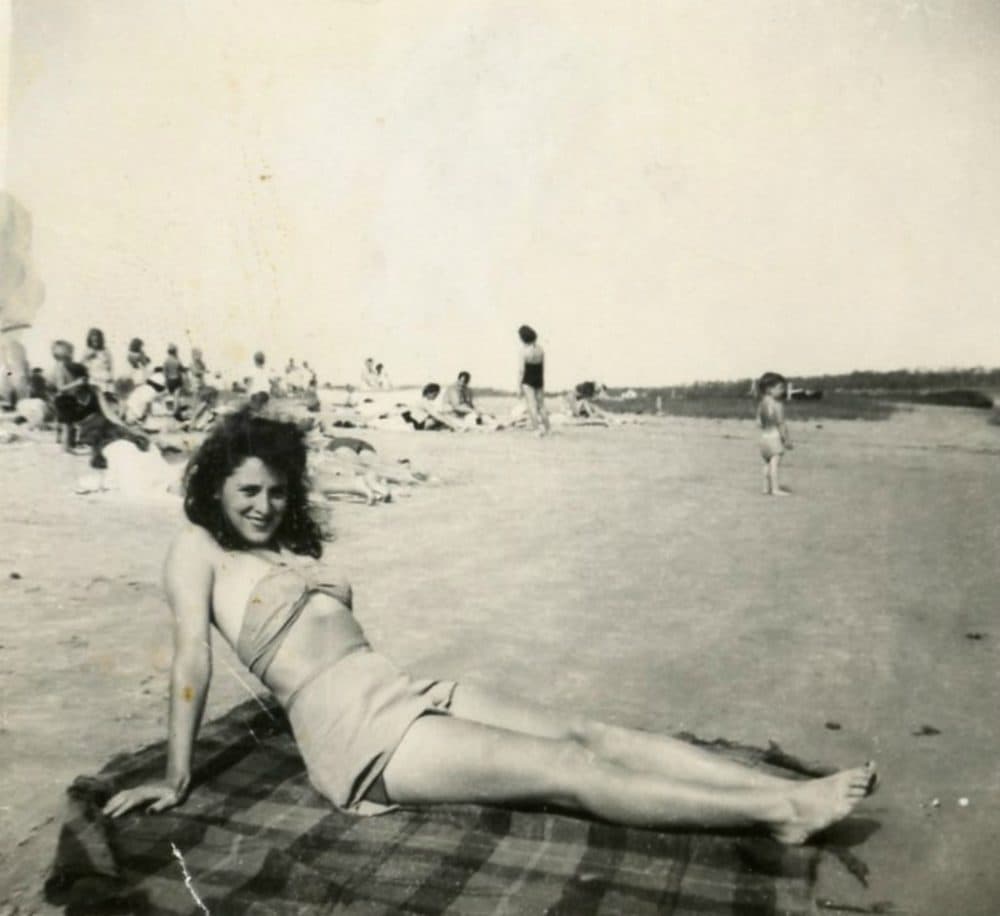Advertisement
Commentary
My Mother And The Sea

My mother stood at the edge of the water near the cottage she rented every year in Wareham and performed what we kids called the “Italian dip.” She waded in up to her knees, crouched and splashed her chest and arms with the icy waters of the bay. Then, ablutions over, she went back to her blanket and soaked in the sun. Before immigrating to America, my Italian mother had lived her life surrounded by the Apennines, the mountain range that forms the spine of Italy. In this country, she loved living at sea level.
The first time I walk into the Mediterranean, the temperature of the water is a revelation. I am astonished that my body is able to flow into the sea without adjustment. It’s as if I am walking backward into a womb, forming a synthesis that must be part amniotic fluid. The physical rules of space begin to fall away. In this waking dream, I feel as if I could now take flight or walk through solid things like a ghost.
This water is saltier, ancient, welcoming. It surrounds me in a maternal embrace that makes me question why "mare" in Italian is ascribed a masculine descriptor. Didn’t all life emerge from the ocean? The water that holds me in that storied sea feels like a mother, like the source of all life. But my mother’s association with the Mediterranean was as a place of tears, of escape from an arranged marriage and a looming war. For my mother, that sea was a place of forced departure and separation from her own mother, who died six months after her arrival in America.
I had a primal dread that my mother’s love would drag me down, steal the air from my lungs, drown me in her otherness.
In the deep south of Italy, the beach is baby-powder soft; I can float like an angel without wings and glide towards the mirrored blue, reborn into a languid body stupefied by sun. This magically fluid new body is one that is still somehow familiar. It’s the spirit-form from my childhood dreams, when I thought I could make myself grow like Alice to Amazon-size in an instant, or walk a tightrope to the stars.
On the south shore of Boston, the place where I swim every day in summer demands that I pick my way over a rocky beach in some ancient warrior rite-of-passage, on the alert for concealed assassins, the jagged clamshell lying in wait to stab my instep from its half-submerged hiding place. I submit my shrinking flesh to the water’s cold embrace, screaming in protest like a newborn entering an unforgiving world, finally submerging after enduring in stages the shock waves to my body, and surrendering to the merciless Atlantic. But it is finally this crueler rite that I prefer: After an hour of treading water in the bay, my flesh feels firmer, my heartbeat stronger, my life somehow affirmed. The water and I are equals, adversaries with a grudging respect for one another.
[M]y mother and I were enemies facing off against the cultural barriers that made us strangers bound by blood.
This acceptance mirrors the hard-won relationship I had with my mother. During the youthful wars of attrition that lasted well into my 20s, my mother and I were enemies facing off against the cultural barriers that made us strangers bound by blood. Embracing the Med felt like a chance to rewrite those years of criss-cross misunderstandings.
My mother called me by her own name, Mamma, in the way of southern Italian mothers, implying there was no defining point where she ended and I began. I had a primal dread that my mother’s love would drag me down, steal the air from my lungs, drown me in her otherness. When I became a mother, I finally understood the blurred lines that parenting can bring, the overlapping of one life with another. I knew my son was a separate, unique person. But I sometimes slipped and found myself calling him “Mamma.”
I am here, in the flinty Northeast, the place where I began. The Med is a whisper, a memory in the omphalos, a life remembered in the cells I hold within, the legacy from my immigrant mother, who sailed away on this ancient sea to find her "destino" on a wilder American shore. Now she visits only in dreams, often sitting by the ocean, a symbol for the power and the depth of the love that holds us close.
